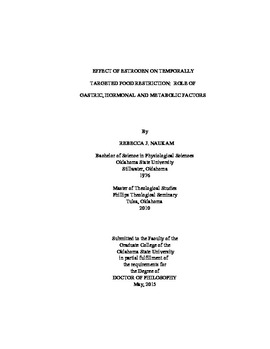| dc.contributor.advisor | Curtis, Kathleen S. | |
| dc.contributor.author | Naukam, Rebecca Jane | |
| dc.date.accessioned | 2016-01-20T15:45:38Z | |
| dc.date.available | 2016-01-20T15:45:38Z | |
| dc.date.issued | 2015-05 | |
| dc.identifier.uri | https://hdl.handle.net/11244/25748 | |
| dc.description.abstract | These studies used targeted temporal food restriction (TTFR; access to chow limited to two hours/day) in rats to model the eating pattern of some obese people who restrict their consumption of food to the evening, when activity is typically less, and eat little or no breakfast or lunch. I tested the hypothesis that Estradiol benzoate (EB)-treatment suppresses feeding and decreases body weight during TTFR, as it does during ad libitum feeding conditions, and investigated central nervous system (CNS) and peripheral mechanisms of these effects in TTFR rats that were fed or fasted on test days. | |
| dc.description.abstract | Ovariectomized (OVX) rats lost weight during TTFR, but the weight loss was greater in EB-treated rats. However, both EB-treated and oil vehicle-treated (OIL) control rats ate comparable amounts. To investigate central mechanisms of EB effects during TTFR, I examined neural interactions in the hindbrain nucleus of the solitary tract (NTS), where vagal afferents from the gastrointestinal tract terminate. cFos labeling in the NTS was increased in TTFR-fed rats, indicating neuronal activation associated with consumption of a meal. However, cFos immunolabeling was not affected by EB treatment. Moreover, numbers of the ? subtype of estrogen receptors in the NTS were not affected by hormone treatment or feeding condition. | |
| dc.description.abstract | To investigate peripheral mechanisms underlying EB effects during TTFR, we assessed carbohydrate and fat metabolism, and related hormones. Plasma insulin was not different between hormone groups. Plasma glucose was in the physiological range, though lower in EB-treated rats. Liver glycogen was at physiological levels in ad libitum conditions, decreased as expected in TTFR-fasted groups, and was partially restored in TTFR-fed groups. Plasma leptin was not different between hormone groups, decreased as expected in TTFR-fasted groups, and then was partially restored in TTFR-fed groups. Plasma triglycerides (TG) and plasma free fatty acids (FFA) were elevated in EB-treated rats. Adrenal weights and plasma corticosterone were greater in EB-treated rats, which may indicate stress associated with TTFR. In addition, fat metabolism is affected by corticosterone, which may explain EB effects on TGs and FFAs and, thus, the differences in body weight during TTFR despite the lack of effect on food intake. | |
| dc.format | application/pdf | |
| dc.language | en_US | |
| dc.rights | Copyright is held by the author who has granted the Oklahoma State University Library the non-exclusive right to share this material in its institutional repository. Contact Digital Library Services at lib-dls@okstate.edu or 405-744-9161 for the permission policy on the use, reproduction or distribution of this material. | |
| dc.title | Effect of estrogen on temporally targeted food restriction: Role of gastric, hormonal and metabolic factors. | |
| dc.contributor.committeeMember | Benjamin, Bruce A. | |
| dc.contributor.committeeMember | Miller, Kenneth E. | |
| dc.contributor.committeeMember | Kennison, Shelia M. | |
| osu.filename | Naukam_okstate_0664D_13968.pdf | |
| osu.accesstype | Open Access | |
| dc.type.genre | Dissertation | |
| dc.type.material | Text | |
| thesis.degree.discipline | Biomedical Sciences | |
| thesis.degree.grantor | Oklahoma State University | |
